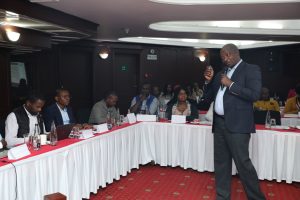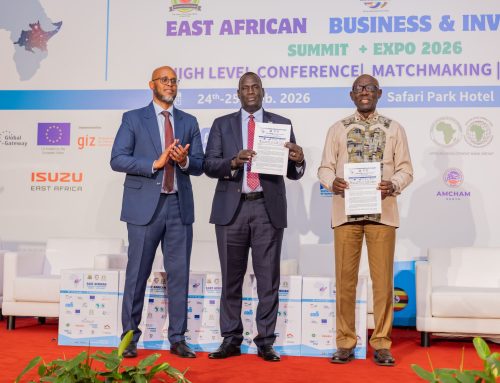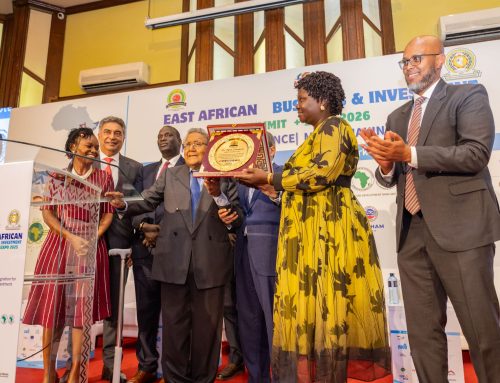- Kenya’s goods exports to Africa reached USD 3.1 billion in 2023.
Nairobi, Kenya, 29th October 2024 — The East African Business Council (EABC) has successfully trained over 50 small and medium-sized enterprises (SMEs) in partnership with the Team Europe Technical Assistance Facility to Support the AfCFTA and Continental Economic Integration (EU-TAF). This training aimed to enhance understanding of the African Continental Free Trade Area (AfCFTA) and covered critical elements such as the Guided Trade Initiative (GTI), the AfCFTA Adjustment Fund, and strategies for value chain integration, marking a significant step towards economic integration in Africa.
In his opening remarks, Mr. Geoffrey Kamanzi, Trade in Services Manager at EABC, noted that Kenya’s imports of goods from Africa reached USD 1.9 billion. At the same time, exports were USD 3.1 billion in 2023, compared to USD 2.29 billion in imports and USD 3 billion in exports in 2022. He highlighted the transformative potential of the AfCFTA, aimed at connecting approximately 1.3 billion people and creating a combined GDP of USD 3.4 trillion. Mr Kamanzi called for swift implementation of the AfCFTA. He urged member states to eliminate tariffs on 90% of goods, emphasising the need for digitalisation and compliance with standards to foster successful partnerships.
Ms. Miriam Bomett, Deputy Head of Policy, Research, and Advocacy at the Kenya Manufacturers Association (KAM), encouraged East African businesses to leverage the AfCFTA to strengthen regional trade, particularly in agricultural and agro-value chain products. She underscored the connection between agriculture and industry and the importance of sourcing raw materials within the EAC to enable continuous product exports. She further advocated for enhanced engagement with regional economic blocs, such as COMESA and SADC, to align tariff structures.
Ms. Bomett further highlighted the financing challenges faced by SMEs under the AfCFTA, calling for increased collaboration between governments and the private sector. She stressed the importance of consolidating financing options to support traders and addressing trade efficiency challenges. Additionally, she reiterated the importance of continuous capacity-building initiatives to link industries with educational institutions, thereby enhancing compliance with standards and market access requirements. Ms. Bomett called for increased financing for SMEs and the bridging of capacity and skills gaps through partnerships between industry and academia to support AfCFTA implementation.
The two-day workshop convened over 50 participants from sectors such as agro-processing, imports, manufacturing, arts and crafts, professional services, business membership organisations, and sectoral associations. Attendees were trained on the opportunities under the Guided Trade Initiative, the AfCFTA Adjustment Fund, and EAC value chain integration under the AfCFTA, with support from the EU-TAF for AfCFTA and continental economic integration.
The AfCFTA prioritises key value chains to drive intra-African trade and industrial growth, including agriculture, agro-processing, pharmaceuticals, automotive, transport and logistics, and textiles and apparel. By focusing on these sectors, the AfCFTA aims to create jobs, boost regional trade, and strengthen Africa’s global competitiveness.
The African Export-Import Bank (Afreximbank) and the AfCFTA Secretariat have established the AfCFTA Adjustment Fund, headquartered in Rwanda. The fund supports countries and private entities in transitioning to the AfCFTA trading regime through financing, technical assistance, grants, and mitigation funding.
SMEs engaged in value chain analysis discussions to improve their products and services, with a focus on identifying gaps and opportunities to enhance operational efficiency, resource utilisation, financial performance, product quality, and sustainable competitive advantage within the AfCFTA framework.
The EABC remains committed to empowering the EAC private sector to benefit from the AfCFTA. With continued Support from the Team Europe Technical Assistance Facility (EU-TAF) similar workshops will be held across other countries.
Kenya’s key exports to Africa include coffee, tea, maté, and spices; salt, sulphur, earths and stone, plastering materials, lime, and cement; iron and steel; animal and vegetable fats and oils, and prepared edible fats; soap, organic surface-active agents, and washing preparations; pharmaceutical products; plastics and articles thereof; miscellaneous edible preparations; mineral fuels and mineral oils; vehicles and vehicle parts; articles of iron or steel; and tobacco and manufactured tobacco substitutes.
Kenya’s imports from Africa include mineral fuels and mineral oils; iron and steel; sugars and sugar confectionery; cereals; essential oils and perfumery products; wood and wood articles; paper and paperboard; vehicles and vehicle parts; dairy products, eggs, and honey; fertilizers; plastics and articles thereof; beverages, spirits, and vinegar; electrical machinery and equipment; residues and waste from the food industries; animal and vegetable fats and oils; and ores, slag, and ash.







